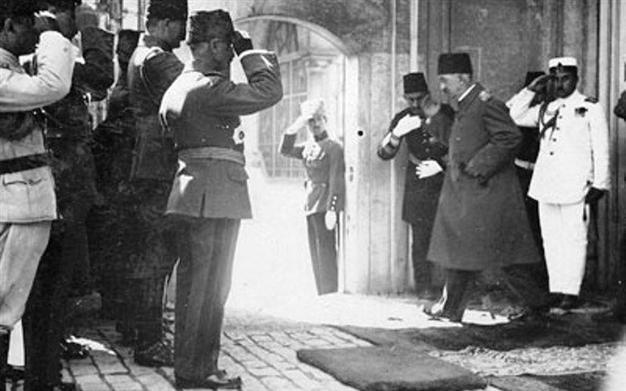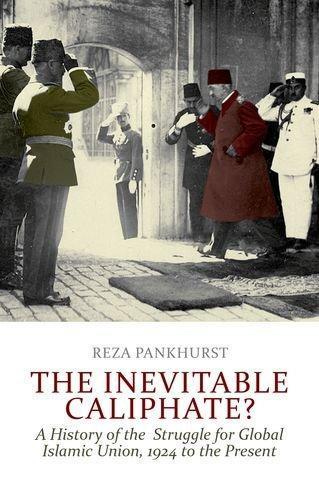The inevitable caliphate?
William ARMSTRONG - william.armstrong@hdn.com.tr
 ‘The Inevitable Caliphate? A History of the Struggle for Global Islamic Union, 1924 to the Present’ by Reza Pankhurst (Hurst, £18.99, 280 pages)
‘The Inevitable Caliphate? A History of the Struggle for Global Islamic Union, 1924 to the Present’ by Reza Pankhurst (Hurst, £18.99, 280 pages)
The recent declaration of Abu Bakr al-Baghdadi as the new Islamic caliph by jihadi militant group ISIS was greeted by foreign observers with a mixture of bewilderment, mirth, fear and panic. Whatever the response, there’s no doubt that the blockbuster announcement brought more attention to the issue of the caliphate, seen by many as the ultimate symbol of Muslim political unity, than it has received in years. Reza Pankhurst’s “The Inevitable Caliphate?” is a timely consideration of how the idea has animated and inspired Muslim intellectuals and activists over the past century, and how it is used by various groups today. Pankhurst was jailed by the Mubarak regime in Egypt for four years over his membership of Hizb ut-Tahrir, an international party campaigning non-violently for the reestablishment of the caliphate and the founding of a “single Islamic state which implements Islam and calls the world to Islam.” With such a background, he can hardly be accused of lofty impartiality, but it does mean that he knows quite a lot about the subject. As ISIS plants roots just across Turkey’s border, “The Inevitable Caliphate?” is a worthwhile read.
Most of the book is taken up with analysis of major Islamic movements - both Arab and non-Arab - since the caliphate was abolished in the early Turkish Republic in 1924, tracing where they differ and what they share. These include the Khilafat Movement in British India, the Muslim Brotherhood, al-Qaeda, and of course Hizb ut-Tahrir - about which Pankhurst is an unreliable expert. The Hizb represented something of an anomaly when it first emerged in the 1950s, a time when the secular ideologies of nationalism and socialism held most sway in the Arab world. However, interest in the caliphate rose along with the resurgence of Islamic feeling in the second half of the 20th century, which developed in response to the perceived failure of alternative ideologies, whether Arab nationalism or complete Westernization. Pankhurst argues that the failure of modern Muslim-majority states to respond to demands to better the situation of their citizens, socially and economically,
[H]as meant that the artificially established and imposed nation-states of the region faced severe legitimacy deficits – helping to explain the increasing popularity of Islamic politics. With increased religiosity across Muslim countries, it is not unnatural that the call for the caliphate is now embraced by a diverse range of Muslims.
Of course, it’s impossible today to read of this collapse of legitimacy and not think of the Arab uprisings since 2010. Those uprisings have collapsed into regional and sectarian fragmentation, and despite (or perhaps because of) this fragmentation, Pankhurst probably believes that the caliphate is an idea whose time has now come. In broad terms, he writes, “the idea of unity on the basis of religion rather than race, one of the critical aspects of the caliphate and its use in modern discourse, has become a mainstream aspiration in the Muslim world today, and as such is an issue that few groups would ignore.” Compounding this is what he describes as the slow collapse of Western political hegemony in the past two decades, which he argues opens up new space for discussion of the caliphate.
If you’re already inclined to believe it, all this makes logical sense. But there are big contradictions in any thesis that sees the return of the caliphate as inevitable, or even desirable. Pankhurst returns throughout the book to a recent academic study which revealed that 71 percent of Muslims across four countries agreed that “strict application of Sharia law in every Islamic country” was required, and 65 percent agreed with the goal of unifying “all Islamic countries into a single state or caliphate.” But while those who want a return of a single Islamic polity may rail against the dissolution of political unity, differences of opinion, the division of the “umma” into “nations” and the division of “nations” into parties and factions, history tells us that such divisions are unavoidable. Most Muslims may well find rule under one caliph in one Islamic state an attractive idea, but 1.6 billion people will inevitably remain divided by language, political ambition, economic development, and interpretation of history.
For all the nostalgia, this was also the case during the former “golden era” of the caliphate(s) that many Muslims look back on so fondly. Still, whatever the fate of al-Baghdadi and ISIS, at a time of turmoil and fragmentation the idea of a single caliphate looks likely to continue as an ideal that many Sunni Muslims will continue to lacerate themselves with.
 ‘The Inevitable Caliphate? A History of the Struggle for Global Islamic Union, 1924 to the Present’ by Reza Pankhurst (Hurst, £18.99, 280 pages)
‘The Inevitable Caliphate? A History of the Struggle for Global Islamic Union, 1924 to the Present’ by Reza Pankhurst (Hurst, £18.99, 280 pages) The recent declaration of Abu Bakr al-Baghdadi as the new Islamic caliph by jihadi militant group ISIS was greeted by foreign observers with a mixture of bewilderment, mirth, fear and panic. Whatever the response, there’s no doubt that the blockbuster announcement brought more attention to the issue of the caliphate, seen by many as the ultimate symbol of Muslim political unity, than it has received in years. Reza Pankhurst’s “The Inevitable Caliphate?” is a timely consideration of how the idea has animated and inspired Muslim intellectuals and activists over the past century, and how it is used by various groups today. Pankhurst was jailed by the Mubarak regime in Egypt for four years over his membership of Hizb ut-Tahrir, an international party campaigning non-violently for the reestablishment of the caliphate and the founding of a “single Islamic state which implements Islam and calls the world to Islam.” With such a background, he can hardly be accused of lofty impartiality, but it does mean that he knows quite a lot about the subject. As ISIS plants roots just across Turkey’s border, “The Inevitable Caliphate?” is a worthwhile read.
The recent declaration of Abu Bakr al-Baghdadi as the new Islamic caliph by jihadi militant group ISIS was greeted by foreign observers with a mixture of bewilderment, mirth, fear and panic. Whatever the response, there’s no doubt that the blockbuster announcement brought more attention to the issue of the caliphate, seen by many as the ultimate symbol of Muslim political unity, than it has received in years. Reza Pankhurst’s “The Inevitable Caliphate?” is a timely consideration of how the idea has animated and inspired Muslim intellectuals and activists over the past century, and how it is used by various groups today. Pankhurst was jailed by the Mubarak regime in Egypt for four years over his membership of Hizb ut-Tahrir, an international party campaigning non-violently for the reestablishment of the caliphate and the founding of a “single Islamic state which implements Islam and calls the world to Islam.” With such a background, he can hardly be accused of lofty impartiality, but it does mean that he knows quite a lot about the subject. As ISIS plants roots just across Turkey’s border, “The Inevitable Caliphate?” is a worthwhile read.